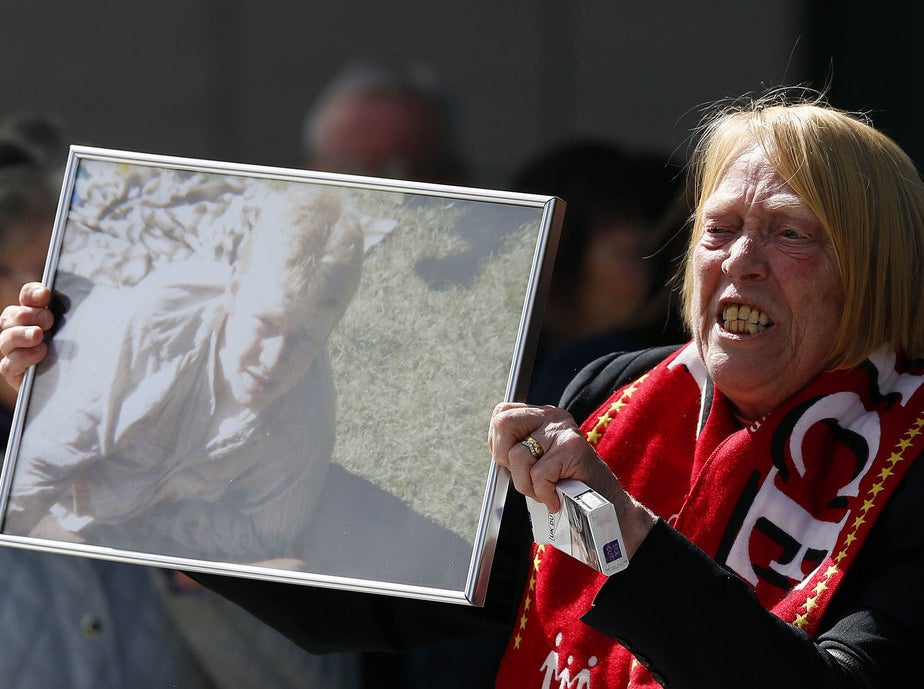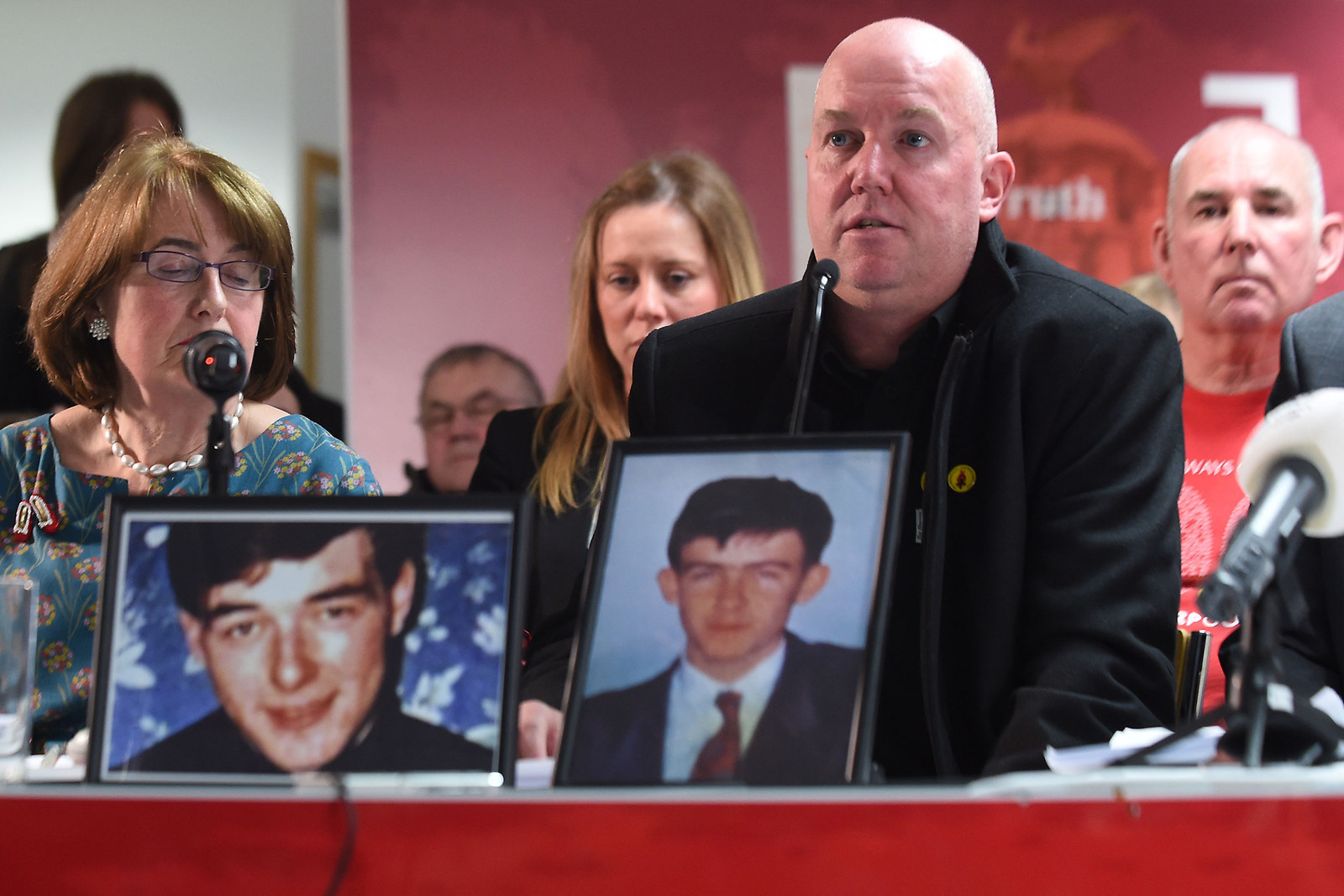
As prosecutors consider whether to bring charges against police responsible for the unlawful killing of 96 football fans at the Hillsborough disaster in 1989, the bereaved families are now seeking damages from police for "abuse" and attempts to conceal their role in the tragedy.
Saunders Law, a firm representing the families, said on Thursday it had entered a high court claim for misfeasance in public office against the South Yorkshire and West Midlands police forces.
The charge alleges the forces abused their power by "spreading lies, doctoring evidence, pressurising witnesses and suppressing the truth".
Saunders Law said the evidence "points to abuse on an industrial scale by both South Yorkshire and West Midlands Police, beyond any 'one bad apple' analysis".


The firm said South Yorkshire police spent £19 million defending themselves at a two-year inquest that on Tuesday ruled unequivocally that the deaths were the result of serious errors committed by the commanding officer at the FA Cup semi-final between Liverpool and Nottingham Forest where the disaster took place. The inquest exonerated the fans of any wrongdoing.
Saunders Law's claim was entered in the high court in 2015 but the firm successfully sought a court order to make it secret until the inquest had ended, to prevent any prejudice to those proceedings.
On Wednesday, the chief constable of South Yorkshire police, David Crompton, was suspended on full pay for his role in defending the force's involvement in the disaster. He was strongly criticised for employing lawyers to challenge the families' evidence at the inquest.
Crompton stood down hours after Andy Burnham, the Labour MP for Leigh, who has championed the Hillsborough families' fight for justice, made a speech calling for the police to be held to account for a "27-year cover-up".
The Crown Prosecution Service also expects to receive evidence from two separate criminal inquiries into Hillsborough by the end of the year.
The jury's decision at the inquest that Duckenfield was responsible for the deaths was made on a criminal burden of evidence: beyond all reasonable doubt. Duckenfield was tried on manslaughter charges in 2000 but the jury failed then to reach a verdict.
Among others who could face criminal charges are the Football Association, Sheffield Wednesday FC, and other individual police officers, as well as South Yorkshire police as an organisation.
The charges being considered include conspiracy to pervert the court of justice, perverting the course of justice, perjury, misconduct in public office, and health and safety offences.
The two investigations – one by the Independent Police Complaints Commission (IPCC) and one by Operation Resolve, an independent police inquiry run by a former chief constable of Durham – both began before the inquest had begun in 2014, but lawyers for the families said the verdict had given prosecutors a new impetus.
Elkan Abrahamson, director of Liverpool-based law firm Broudie Jackson Canter, which represented 20 of the Hillsborough victims' families throughout the inquest, told BuzzFeed News the pressure to bring charges, particularly against David Duckenfield, the commanding officer at the 1989 match, has now intensified.
"All the jury can [usually] say is ‘these people were unlawfully killed’," he said, "they can’t say who did it, but they were told that they could only return this verdict if they were satisfied that David Duckenfield was responsible for killing these people, even though you can’t name him."
Abrahamson said the families' lawyers are going to closely monitor the investigations and "make sure they do a proper job".
"We’re not saying ‘you have to charge X with Y’, because we won’t have all the evidence because they won’t let us see it. But we have a lot of the evidence and it’s our job to say, ‘Have you asked X this, have you asked Y this? Have you noticed the discrepancies?'"
He pointed out that as well as possible charges related to the unlawful killing, there could be charges for the conspiracy that followed.
"Perhaps equally importantly, there’s the cover-up charges, which were aired in court [at the inquest] but only on a limited basis and the jury wasn’t allowed to comment on it," he said.
“We know that officers fabricated evidence, altered statements – we know officers lied. And I would say that officers lied at the inquest as well, the lies were carried on and that’s perjury. There should be a criminal investigation into that.”
Giving evidence at the inquest in 2015, Duckenfield admitted his failure to close a tunnel, which would have stopped fans accessing the already overcrowded Leppings Lane terrace, caused the death of the 96 fans.
But Abrahamson said it would be wrong to focus solely on the actions of Duckenfield.
"My feeling is that it would be wrong to scapegoat Duckenfield, and you can sort of see that’s the way the bandwagon is rolling," he said. "Maybe everyone would be happy if we just prosecute one guy. He wasn’t acting on his own on that day.
“I do think the investigation should very carefully consider whether there are other people are criminally liable.”

Pete Weatherby QC, who represented 22 families at the inquest, told BuzzFeed News: "The families now, in the light of the inquest conclusions, look forward to prosecution decisions being taken as quickly as appropriate. We don’t want them to be rushed, but frankly these investigations have been going on for a long time and there shouldn’t be that much more to do.
"The jury has spoken, the inquest’s conclusions are highly pertinent to the ongoing investigations, and the families urge the investigations to reach appropriate decisions on prosecutions as soon as appropriate."
The inquest's evidence ran to more than 1 million pages, most of which was uploaded to the inquiry's official website on a daily basis.
The Hillsborough inquest has raised the issue of how the state defends itself in cases where it may have caused deaths through mistakes or negligence.
Deborah Coles, director of Inquest, a legal justice charity that supported the Hillsborough families, told BuzzFeed News that unlawful killing verdicts in inquests have led to criminal charges being brought before – such as with the death of newspaper seller Ian Tomlinson in 2009.
"The clarity and force of the jury conclusions and the personal and systemic failings that it identified must in our view result in criminal charges being brought," she said.
She said the Hillsborough case was rare in that the families had "equality of arms" in terms of their legal representation and that the case illustrated the wider culture of state agencies defending themselves with state-appointed lawyers who then "demonise" people who died.
"It's a culture where state lawyers try to evade blame and responsibility by deflecting attention – in this case they laid the blame at the hands of the supporters and did everything they could to deflect attention from the acts of the most senior police officers," she said.
"That very adversarial approach to these inquests persists today, we see it time and time again, where there are attempts to demonise the person who’s died or attack their character, or that of the family.
"That’s a culture we’ve got to look at very carefully and ask ourselves if in a democratic society, when mistakes or wrongdoing happen [state agencies] need to stand up and accept those."
